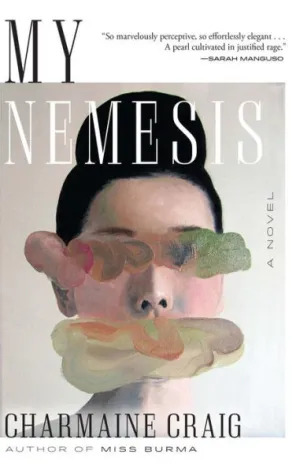A Review of Charmaine Craig’s My Nemesis (Grove/Atlantic, 2023)
![[personal profile]](https://i.gr-assets.com/images/S/compressed.photo.goodreads.com/hostedimages/1491408111i/22407843.png) uttararangarajan
uttararangarajan

Written by Stephen Hong Sohn
Edited by Uttara Rangarajan
I’ve been meaning to review at least one publication by Charmaine Craig, and I’ve finally rectified my reading oversight with this review of My Nemesis (Grove/Atlantic 2023). This novel really packs a wallop through a very crafty and complicated first-person perspective. Let’s let the marketing description help us get situated: “Tessa is a successful writer who develops a friendship, first by correspondence and then in person, with Charlie, a ruggedly handsome philosopher and scholar based in Los Angeles. Sparks fly as they exchange ideas about Camus and masculine desire, and their intellectual connection promises more—but there are obstacles to this burgeoning relationship. While Tessa’s husband Milton enjoys Charlie’s company on his visits to the East Coast, Charlie’s wife Wah is a different case, and she proves to be both adversary and conundrum to Tessa. Wah’s traditional femininity and subservience to her husband strike Tessa as weaknesses, and she scoffs at the sacrifices Wah makes as adoptive mother to a Burmese girl, Htet, once homeless on the streets of Kuala Lumpur. But Wah has a kind of power too, especially over Charlie, and the conflict between the two women leads to a martini-fueled declaration by Tessa that Wah is ‘an insult to womankind.’ As Tessa is forced to deal with the consequences of her outburst and considers how much she is limited by her own perceptions, she wonders if Wah is really as weak as she has seemed, or if she might have a different kind of strength altogether. Compassionate and thought-provoking, My Nemesis is a brilliant story of seduction, envy, and the ways we publicly define and privately deceive ourselves today.”
It’s interesting that the description ends with the phrase, “privately deceive ourselves today.” The reason why I bring it up is that this novel is masterful in its suffocating use of first person. We can’t ever get out of Tessa’s perception of the world, so much so that we only get a sense of the inaccuracy of some of her conclusions only at the end of the novel, when we begin to establish Wah’s own motives as a writer and as an artist. Tessa seems to desire mastery of the web of relationships in which she is entangled, but it becomes evident over time that she hardly has a grasp on the networks surrounding her, some of which are far more frayed than she even realizes. The first line of the novel also unveils a major plot point that won’t be fully engaged until you are well into the novel: “the martini-fueled declaration” that involves a major insult that Tessa throws at Wah is certainly the most incendiary scene that Craig imagines. This event results in a serious disintegration in the complicated ecosystem of relationships that the novel is depicting, including Tessa's marriage.
What is really clear about this novel is that it establishes the ways in which we generate fantasies around the relationships we create in order to construct a measure of social stability, however precarious this artificial world might be. As Tessa grapples with the fallout, the novel revises the way in which we understand the title. Who is Tessa’s actual nemesis, we end up wondering. Craig’s work is the ultimate study in the way in which the first-person narrative can become a destructive hall of illusions.
Buy the Book Here
 comments
comments



